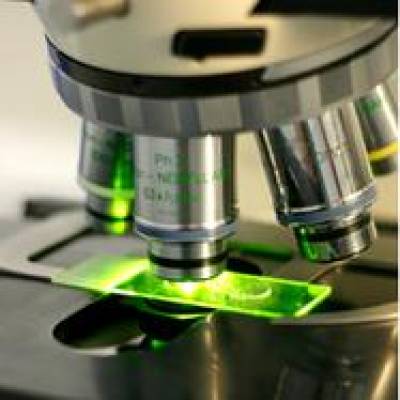Professor Deenan Pillay: directing the path for biomedical research
14 September 2010
Links:
 ucl.ac.uk/iris/browse/profile?upi=DPILL78" target="_self">Professor Deenan Pillay
ucl.ac.uk/iris/browse/profile?upi=DPILL78" target="_self">Professor Deenan Pillay
Professor Deenan Pillay has recently taken on the role of Director at the UCLH/UCL National Institute of Health Research (NIHR) Comprehensive Biomedical Research Centre (CBRC).
Here we find out more about the centre's work and what Professor Pillay will be focusing on as he embarks on the post.
Q: Can you give some background to the history of the centre?
The National Institute of Health Research is a component of the Department of Health, and was established in 2006, following a review of NHS based research.
The UCLH/UCL bid was led by Professor Ian Jacobs, and involved an internal competitive process for selection of themes displaying research excellence, and potential for future expansion. The centre now incorporates 17 themes, extending from neurodiagnostics, through to health services research, and even education.
Research activity is funded through programmed activity as well as through competitive calls for project grant funding and this is coordinated through the UCLH/UCL Research & Development Unit, led by Professor Monty Mythen.
I would like to take this opportunity to acknowledge Ian's superb leadership in successfully bidding for the centre, and establishing a well functioning, and resourced set of research programmes.
Q: What are the aims and objectives of the centre?

The key goal of NIHR is to create a health research system in which the NHS supports outstanding cutting-edge research in support of the needs of patients and the public.
One particular strategy was to establish Biomedical Research Centres to represent a partnership of excellence between an NHS Trust and a university. Following open competition, the NIHR awarded five Comprehensive Biomedical Research Centres (CBRC) and seven smaller Specialist Biomedical Research Centres (SBRC) in 2007 for a period of five years. UCLH/UCL was awarded a CBRC, together with Imperial, Kings, Oxford and Cambridge.
Q: What will be your main points of strategic focus as you take on the post of Director?
At this early stage, my priorities include:
- Establishing the concept of 'research pathways', equivalent to 'care pathways' in clinical medicine. What I mean by this is the process by which basic science discoveries lead to an actual impact on clinical care, via experimental medicine ("first in man"), formal clinical evaluation, production of clinical guidelines, and actual implementation. CBRC is best suited to enhance the speed with which new scientific advances move into early clinical studies - the so called T1 gap - although this does not preclude involvement in all other aspects of the pathway. Such an approach takes advantage of other UCLH/UCL investment, such as the Clinical Research Facilities. It also plays to the UCL (and NIHR/MRC/WT) focus on Experimental Medicine.
- Increasing the profile of CBRC within UCLH and UCL. We will establish a number of roadshows, and 'engagement' events, to demonstrate the relevance of CBRC to those not currently funded by CBRC. This is important not only in itself, but also to ensure that the ethos of research permeates all areas of UCLH, and that researchers in UCL appreciate the opportunities afforded by the CBRC.
- Linking CBRC activities with related research initiatives locally, nationally and internationally. The establishment of UCL Partners provides an ideal opportunity for CBRC-funded research to benefit the widest population, through the roll-out of best practice as well as providing a larger patient base and intellectual input for clinical research initiatives. UCL is unique in hosting two specialist Biomedical Research Centres in addition to the CBRC - those at Great Ormond Street and at Moorfields. We have already issued research calls for joint projects between these BRCs, and this will continue. There is also an expectation of the five CBRCs to interact more constructively in future. Finally, the UCL-Yale collaboration provides an ideal opportunity to link CBRC with a parallel NIH-funded translational research facility based at Yale-associated hospitals. Indeed, as we prepare for a distinct downturn in the UK research-funding environment, we must be imaginative in maximising the opportunities made available by a range of partnerships, including, of course, with the UKCMRI, which will open on our doorstep.
Q: What methodologies and technologies are needed the most to enhance clinical research now?
UCL already hosts a number of world-class technology/methodology themes, from stem cell biology, gene therapy production, medicinal chemistry and computational biology, through to health services research and clinical epidemiology. Likewise, UCLH hosts a wide range of highly specialised clinical services, and facilities for early clinical trials. Many UCLH consultants are at the cutting edge of identifying clinical problems, and developing effective interventions.
My personal view is that we need to establish a better dialogue between these spheres to maximise the opportunities for research progress, rather than to merely increase the array of technologies available to us. Indeed, the CBRC should play a key role in facilitating such a dialogue. One example of this is the UCL Grand Challenge PhD scheme, which we are currently part-funding. The scheme aims to attract 100 students over the next two years into projects that explicitly cross boundaries in Biomedicine and Life Sciences.
Q: What would you like your legacy to be?
It's a little presumptive to be talking of my legacy within a month of starting in post. Of course I would hope that the CBRC generates an increasing portfolio of successful research outcomes that benefit patients. It is also important that CBRC contributes to UCL becoming known as THE UK university in which to best undertake clinically oriented research.
Images above: Professor Deenan Pillay, Cells under a microscope
UCL context
The UCLH/UCL National Institute for Health Research Comprehensive Biomedical Research Centre was established in April 2007 and is at the forefront of world class research into some of the major causes of illness and death. It forms a key part of the Government's strategy for research and development in the NHS.
 Close
Close

